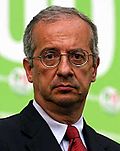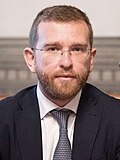Secretaries
| N° | Portrait | Name (Born–Died) | Term of office | Primary election | ||
|---|---|---|---|---|---|---|
| 1 |  | Walter Veltroni (1955– ) | 14 October 2007 | 21 February 2009 | 2007 | |
| 2 |  | Dario Franceschini (1958– ) | 21 February 2009 | 7 November 2009 | None [2] | |
| 3 |  | Pier Luigi Bersani (1951– ) | 7 November 2009 | 20 April 2013 | 2009 | |
| Vacant [3] | 20 April 2013 | 11 May 2013 | ||||
| 4 |  | Guglielmo Epifani (1950–2021) | 11 May 2013 | 15 December 2013 | None [4] | |
| 5 |  | Matteo Renzi (1975– ) | 15 December 2013 | 19 February 2017 | 2013 | |
| Vacant [5] | 19 February 2017 | 7 May 2017 | ||||
| (5) |  | Matteo Renzi (1975– ) | 7 May 2017 | 12 March 2018 | 2017 | |
| Vacant [6] | 12 March 2018 | 7 July 2018 | ||||
| 6 |  | Maurizio Martina (1978– ) | 7 July 2018 | 17 November 2018 | None [7] | |
| Vacant [8] | 17 November 2018 | 17 March 2019 | ||||
| 7 |  | Nicola Zingaretti (1965– ) | 17 March 2019 | 14 March 2021 | 2019 | |
| 8 |  | Enrico Letta (1966– ) | 14 March 2021 | 12 March 2023 | None [9] | |
| 9 |  | Elly Schlein (1985– ) | 12 March 2023 | Incumbent | 2023 | |
Secretary tenure
| Rank | Secretary | Total time in office | Terms |
|---|---|---|---|
| 1 | Matteo Renzi | 4 years, 10 days | 2 |
| 2 | Pier Luigi Bersani | 3 years, 164 days | 1 |
| 3 | Elly Schlein | 2 years, 62 days | 1 |
| 4 | Enrico Letta | 1 year, 363 days | 1 |
| 5 | Nicola Zingaretti | 1 year, 362 days | 1 |
| 6 | Walter Veltroni | 1 year, 130 days | 1 |
| 7 | Dario Franceschini | 259 days | 1 |
| 8 | Guglielmo Epifani | 218 days | 1 |
| 9 | Maurizio Martina | 133 days | 1 |
Secretaries timeline








